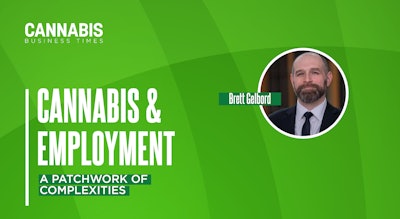
It’s 7:00 a.m. on a Saturday, and you get a text message from the wife of one of your best employees. The employee has been arrested because they were involved in an altercation at a sporting event the night before. They won’t be out of jail until at least Monday, so they’ll miss their shift that day, and they’ve been charged with several crimes. If you run a business in any number of settings, from coffee shops to car factories, this situation poses challenges.
First, you’ve got to find coverage for the shift to ensure business continuity. Then, you’ve got to determine whether there will be any disciplinary consequences for the employee. However, if you run a licensed cannabis operation in Michigan, you may have another task to check off your list: determining whether you’re required to report the situation to your state regulator. That’s because, as an employer in a highly regulated industry, there are often regulations—sometimes buried in the rules—that directly impact the employer-employee relationship in ways large and small. These rules can sometimes slip through the cracks as busy licensees focus on other burdensome compliance issues like financial reporting and physical security requirements. However, compliance with cannabis industry employment rules is just as important as compliance with the other regulations—to say nothing of the variety of state and federal laws governing employment more broadly. Unfortunately, because of the state-specific nature of the cannabis industry, employers in different states have different compliance obligations. And MSOs must be aware of the employment-related rules in each state where they operate and comport their HR policies appropriately.
Compliance with employment rules starts before an employee is even hired. In addition to the background checks required by most state cannabis regulators and the federal immigration verification issues discussed in a recent column, some states, such as Michigan, have prohibitions on overlapping employment across license types. For example, in Michigan an individual cannot be employed simultaneously by a retail establishment and a secure transporter or laboratory, among other permutations. (See Mich. Admin. Code r. 420.602a (2022).) As a result, employers in that state should be sure to confirm that a potential hire is not already working for another license holder. Employers elsewhere should double-check their rules for one-off employment-related requirements like this. Relatedly, some state regulators maintain lists of individuals who are barred from working in the industry for various reasons. Employers should be aware of such lists and if your state has one, always double-check it before extending an offer of employment.
If you are considering hiring someone at the executive level who may warrant high compensation and an employment agreement, a common rule to watch out for focuses on grants of equity. Many states have an ownership percentage threshold that requires regulator approval—or at least notification—of anyone holding over a given percent of equity in a licensee. For example, the ownership threshold in California is 20%, and in Maine it is only 5%. (See Cal. Code Regs. tit. 4, § 15003 (2022); 18-691 Me. Code R. ch. 1, § 2.11 (2022).) One way to potentially sidestep this requirement is by offering phantom equity or, in appropriate circumstances, profit interests to new C-Suite hires. However, in several states, including California and Michigan, even without any equity, if the new executive is considered a “managerial” employee, they may still have to be approved by—or at the very least identified to—the state regulator. (See Cal. Code Regs. tit. 4, § 15003 (2022); Mich. Comp. Laws § 333.27102 (2021).)
Once hired, the requirements continue. In New Jersey, for example, every cannabis employee is required to register with the state regulator and be issued a cannabis business identification card. (See N.J. Admin. Code § 17:30-8.1 (2023).) The rules around employee ID cards run the gamut from non-existent to highly specific. California’s rule on ID cards might be the most specific, as cannabis retailers there must require their employees to:
“display a laminated or plastic-coated identification badge issued by the licensee at all times while engaging in commercial cannabis activity. The identification badge shall, at a minimum, include the licensee's ‘doing business as’ name and license number, the employee's first name, an employee number exclusively assigned to that employee for identification purposes, and a color photograph of the employee that clearly shows the full front of the employee's face and that is at least 1 inch in width and 1.5 inches in height.” (See Cal. Code Regs. Tit. 4, § 15043 (2022).)
In terms of managing a workforce more generally, the rules vary from state to state. Some states require cannabis employers to enter into labor peace agreements with unions—although some of those rules are being challenged, such as in Oregon where a federal court recently ruled that the state’s labor peace agreement law was unconstitutional because it contained a restriction on the employer’s ability to discuss unionization. That ruling is being appealed as of this writing. (See Casala, LLC v. Kotek, No. 3:25-cv-244-SI, 2025.). Regardless, if your state requires such agreements, be sure to consult with an experienced labor attorney, because the rules around unionization are complex and violations can result in unwanted attention from the National Labor Relations Board.
Some states have requirements that employers establish training for employees in standard operating procedures (SOPs), and that the training materials be available for inspection by the state regulator. For example, training records must be kept for 5 years in Illinois and must be readily available for inspection upon 48 hours’ notice. (See Ill. Admin. Code tit. 8, § 1300.155 (2020).) From an employment recordkeeping standpoint, awareness of such a rule is crucial, and a determination should be made as to whether training records should be kept centrally or individually in each employee’s personnel file—or both.
Finally, there are rules that apply to the end of the employment relationship as well. Returning to the opening example of the arrested employee, if the employer is in New Jersey instead of Michigan and fires the employee, while the employer may not have to report the arrest or criminal charges to the state, they will have to report the termination. (See N.J. Admin. Code § 17:30-8.2 (2023).) Additionally, states with employee ID requirements often require the licensee to secure a departing employee’s work ID and either destroy it or return it to the state. (See N.J. Admin. Code § 17:30-8.3 (2023).)
This article highlights just a few ways cannabis rules and regulations from around the country can affect the employer-employee relationship. Moreover, employers in the cannabis industry are also required to follow the patchwork of federal and state employment laws that are generally applicable to employers in all industries, such as the:
· Family and Medical Leave Act (FMLA),
· National Labor Relations Act (NLRA),
· the Worker Adjustment and Retraining Notification (WARN) Act,
· the Americans With Disabilities Act (ADA),
· Title VII of the Civil Rights Act,
· the Age Discrimination in Employment Act (ADEA),
· and any applicable state corollaries.
In light of that, cannabis employers must go the extra mile to ensure that their employment policies and practices are compliant with all applicable rules, whether specific to their state’s cannabis industry or generally applicable to employers everywhere. In order to meet that legal burden, it is critical to have an HR partner who is well-versed in the employment-specific aspects of cannabis regulations, and it is highly advisable that cannabis employers consult with an experienced employment attorney who also understands the cannabis regulatory landscape in their state.
Brett Gelbord is a member in Dykema’s Detroit office and part of the firm’s Labor & Employment and Cannabis Industry groups, where he advises employers on day-to-day workforce issues, litigation strategy, and compliance matters. He works closely with cannabis businesses, combining employment counsel with commercial litigation experience to address challenges unique to the industry. Gelbord is a frequent author on labor and employment issues in cannabis, regularly co-hosts Dykema’s cannabis podcast “A Higher Law,” and is a founding member of the Psychedelic Bar Association.
Katheine Koczak contributed to this article.


























